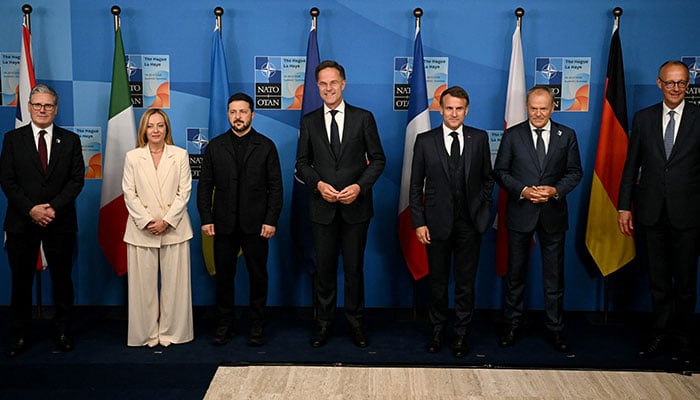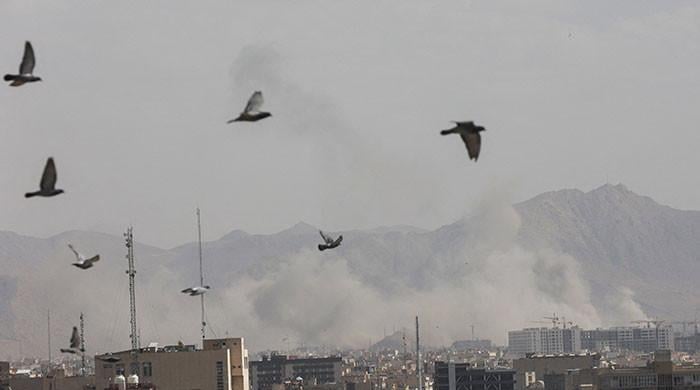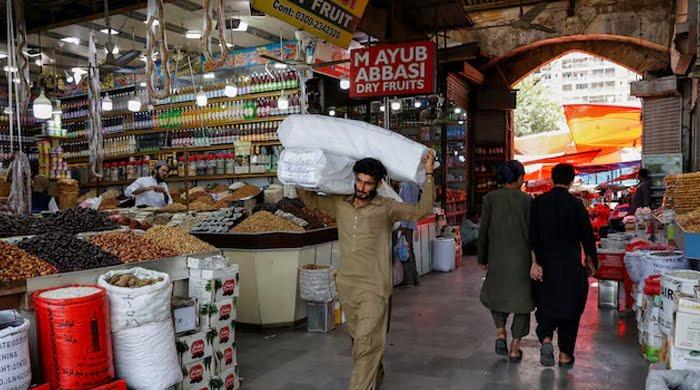Welfare not warfare
Nato conference clearly indicates that politicians are least concerned about financial hardships of ordinary citizens
June 30, 2025

Amidst falling living standards and attacks on social welfare systems by the advanced capitalist world's ruling elites, the Global North's governments have pledged to pump more resources into the non-productive sector of the economy called armament and defence expenditures.
The solemn pledges made during the recent Nato conference in The Hague clearly indicate that politicians in the advanced capitalist countries are least concerned about the financial hardships of ordinary citizens that have multiplied after the pandemic.
The summit witnessed the tremendous generosity of these ruling elites, who are not ready to extend a few billion dollars to alleviate the suffering of the people belonging to marginalised sections of their societies. The representatives of 31 states, who have been implementing ruthless austerity policies in their countries, did not bother to invoke the mantra of taxpayers’ money that they are not tired of repeating while cutting down on ordinary people’s benefits.
The moot decided to increase the defence budget from the current 2.0% to 5.0% of the GDP within the next 10 years. Out of this, 3.5% would purely be used for military expenditure, such as troops and weapons, while another 1.5% would be invested in cyber security, infrastructure and the construction of barracks. Except Spain, no country questioned the rationale for such a huge investment in a sector that would possibly create more problems for those seeking peaceful solutions to conflicts across the world, especially on the European continent.
The expenses of this gathering also show how callously ruling elites spend money when it comes to their own comforts and luxuries. For instance, the working session of the event lasted for two and a half hours only, but cost €183 million. In terms of lavishness, the event was not less than a royal wedding, attracting around 9000 dignitaries, including 45 heads of state and government and just as many foreign and defence ministers. The attendees enjoyed foolproof security which must have cost a lot of money. Large parts of The Hague were cordoned off on the occasion, possibly to block protests.
For a long time, the US has been the biggest military spender in the world. It is likely to retain this position. At one point its defence budget was greater than the combined budget of 36 next big spenders, including the UK, France, China, Russia and some others. Estimates suggest that Nato might end up spending $2.8 trillion on military and defence. Some experts believe this is more than the entire annual economic output of Canada or Italy.
The announcement to increase the defence expenditures might have created a ripple of excitement among the warmongers sitting in power corridors of London, Washington and Paris, but is likely to affect millions of people living not only in the Global North but in the Global South as well. It is also likely to add to the financial woes of the member states' masses. Except for Germany, which has a low debt ratio of 63% and is in a position to carry out massive new borrowing, it will be difficult for other countries to meet this target. For instance, the United Kingdom and Spain with the ratios of 100% or Belgium and France, having a debt ratio of 105% and 113% respectively, will find it extremely hard to meet the target without creating immense hardships for their people.
The summit's outcome has greatly appeased US President Donald Trump, who has been pressuring European countries to increase their military budgets. Many believe that since the US is the largest arms manufacturer in the world, most of the members would be purchasing weapons from Washington, boosting the American economy and creating more jobs for Trump’s supporters.
It is believed Trump would describe such summits as one of his successes, assuring people that it will go some way in revitalising America's manufacturing sector, which has witnessed a tremendous downward spiral since China joined the World Trade Organisation decades ago. Such a rise will also benefit arms manufacturing companies in countries like the UK, France and Germany. Oil corporations in the US and Europe will also benefit from it because global armed forces are the biggest consumers of fossil fuels.
But this would spell disaster for the working classes of the Global North in general and Europe in particular, who have already been grappling with the effects of ruthless austerity for years now. In the UK, pensioners and disabled people are finding it extremely hard to make ends meet, while working classes in other parts of Europe are unable to meet their monthly expenses owing to rising inflation.
Such a rise has also created a spectre of more confrontation with Russia and China, which must have been alarmed over the tremendous surge in military budgets of the Western countries. This would create an impression that Trump's peace claims are nothing but empty slogans. It will also prove that no American president can defy the military-industrial complex that always seeks more allocations for the non-productive sector of the economy, which gifts the Global South with wars and conflicts and hands falling living standards to the people in the Global North.
According to the Stockholm International Peace Research Institute (SIPRI), world military expenditure reached $2718 billion in 2024, an increase of 9.4% in real terms from 2023 and the steepest year-on-year rise since at least the end of the Cold War. "Military spending increased in all world regions, with particularly rapid growth in both Europe and the Middle East. The top five military spenders — the United States, China, Russia, Germany and India — accounted for 60% of the global total, with combined spending of $1,635 billion".
The Euro area unemployment rate was 6.2% in April 2025. In 2024, 93.3 million people in the EU were at risk of poverty or social exclusion, equivalent to 21.0%t of the EU population. It was higher for women than for men (21.9% compared with 20.0%. The situation is not rosy in the US either, where 36.8 million people were considered to be in poverty in 2023.
Such spending will force European governments and other Nato members to cut down benefits of ordinary people further, prompting them to intensify attacks on social welfare systems in those countries. Consequently, xenophobia and anti-immigrant hatred would witness a phenomenal surge with ordinary European working classes holding foreigners or non-natives responsible for their financial hardships while in reality, it is their ruling elite that is ready to pump trillions of dollars into armament, wars and conflicts but reluctant to spend money on disabled, pensioners and other vulnerable sections of society.
The ruling classes can be forced to revisit their decision by mounting an effective defence of the social welfare system that has extended help and succour to millions of people across the European continent and other advanced capitalist states. The working classes might have to learn from direct action groups in several parts of Europe, staging demonstrations outside the offices of their respective members of parliaments or politicians to register a strong protest against this investment in death, destruction and annihilation.
The recent rebellion of the British Labour Party's MPs against a proposed bill cutting down benefits of vulnerable people indicates that elected representatives could still be forced to work in favour of people. The people of Europe would have to make it clear that they want welfare and not warfare.
The writer is a freelance journalist who can be reached at: [email protected]
Disclaimer: The viewpoints expressed in this piece are the writer's own and don't necessarily reflect Geo.tv's editorial policy.
Originally published in The News











